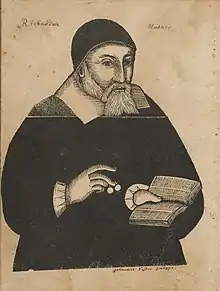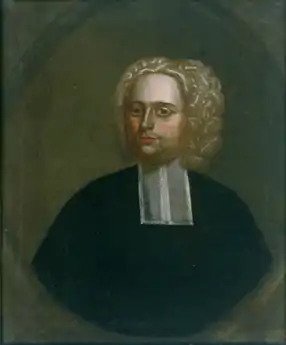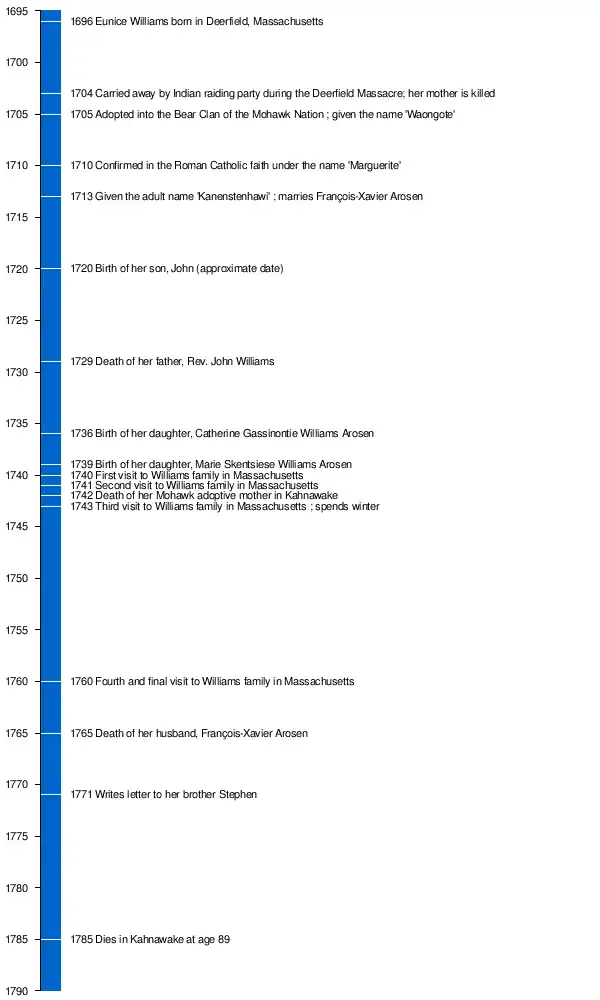Eunice Kanenstenhawi Williams
Eunice Williams, also known as Marguerite Kanenstenhawi Arosen, (17 September 1696 – 26 November 1785) was an English colonist taken captive by French and Mohawk warriors from Deerfield, Massachusetts in 1704. Taken to Canada with more than 100 other captives, the seven-year-old girl was adopted by a recently converted Mohawk family at Kahnawake and was fully assimilated into Mohawk society. Baptized as a Catholic under the name "Marguerite" and renamed A'ongonte meaning "she has been planted as a person," she eventually married a Mohawk man, François-Xavier Arosen, had several children, and remained with the Mohawk for the rest of her life. While choosing not to return to her natal family, she, along with her children, repeatedly made the trek to Deerfield to visit with her Puritan siblings over the course of her life. Her father, Rev. John Williams and her brother Samuel made numerous efforts to ransom her to no avail. Moreover, they failed to persuade her to return to Massachusetts and the bosom of her birth family. Hers was one of the more famous Indian captivity stories.
Eunice Kanenstenhawi Williams | |
|---|---|
| Born | 17 September 1696 Deerfield, Massachusetts |
| Died | 26 November 1785 (aged 89) Kahnawake, Quebec |
Early life and education


Eunice Williams was born on 17 September 1696, the daughter of the Puritan minister John Williams and his wife Eunice Mather Williams. On 29 February 1704, the Williams' home was attacked during a raid on the settlement led by French and allied Abenaki and Mohawk fighters. Later called the Deerfield Massacre, the event was part of a series of raids and conflicts between the French and English, and their Indian allies, during Queen Anne's War in the early 18th century.
The Indians killed numerous settlers in their houses, including Eunice's six-week-old sister Jerusha and younger brother John Williams, Jr. They took captive more than 100 settlers, including 7-year-old Eunice, her parents, and four of her siblings. The captives were taken on a strenuous march northward. The next day, a Mohawk warrior killed her mother after she fell while crossing the icy waters of the Green River. Others of the youngest and oldest captives were killed if they could not keep up with the large party.
Eunice and the surviving members of her family reached Fort Chambly in Quebec six weeks later; from there she was taken to Kahnawake, a settlement of Catholic Mohawks south of Montreal across the St. Lawrence River. She was adopted by a woman who had recently lost her own daughter in a smallpox epidemic. Eunice was given the symbolic name Waongote, meaning "one who is planted like an Ashe", and was instructed in the Mohawk language and customs, and catechized in the Roman Catholic religion. When she converted to Catholicism, she was baptized Marguerite.
When the survivors of Deerfield learned that their captured relatives and neighbors were being held in Quebec, they began negotiations through various intermediaries to ransom them. During these years, Rev. Williams was allowed to meet with Eunice on two occasions; both times he responded to her requests for guidance by telling her to frequently recite the Puritan Catechism.
Later life
When the senior Williams' ransom and freedom were arranged about three years later, he thought to have Eunice reunited with him. The French told an intermediary that this was impossible because the Mohawk with whom she was forced to live with "would as soon part with their hearts as the child," as she was the replacement for their child who had recently passed away. The French government would not generally interfere when the Mohawk adopted captives, even if they were European. He was able to redeem his other children, who returned to live in Massachusetts.[1]
Eunice became fully assimilated into the tribe, at age 16 marrying a young Mohawk man, François-Xavier Arosen, age 25. They had three children together. Nonetheless, Rev. Williams, succeeded by his son Stephen, continued through the years to try to ransom and later persuade Eunice to rejoin her New England family.[2]
Eunice, called Kanenstenhawi as her adult Mohawk name, finally returned to New England in 1741, by which time her father had died. Her brother Stephen had kept in touch with her. When Eunice and her husband went to Massachusetts, it was with a guide and interpreter, as they spoke only Mohawk and French. She made two more visits to her Williams family, bringing her children with her and one year staying for an extended period through the winter.[3]
Timeline

Source notes
- Demos, John Putnam. The Unredeemed Captive: A Family Story from Early America. New York : Alfred Knopf: distributed by Random House, Inc., 1994
- Demos, John Putnam. The Unredeemed Captive: A Family Story from Early America. New York : Alfred Knopf: distributed by Random House, Inc., 1994
- Demos, John Putnam. The Unredeemed Captive: A Family Story from Early America. New York : Alfred Knopf: distributed by Random House, Inc., 1994
Content notes
^ siblings: Eunice's siblings who survived the raid and made the trek to Canada with her were Samuel (15), Esther (13), Stephen (9) and Warham (4). The Williams' eldest child, Eleazer (16), was away studying for the ministry and not living at Deerfield at the time of the raid. The other Williams children were eventually redeemed and returned to New England.
References
Printed matter
- Demos, John Putnam.. The Unredeemed Captive: A Family Story from Early America. New York : Alfred Knopf: distributed by Random House, Inc., 1994. ISBN 0-394-55782-4
- Haefeli, Evan and Kevin Sweeney. "Revisiting the Redeemed Captive: New Perspectives on the 1704 Attack on Deerfield," in After King Philip's War, Presence and Persistence in Indian New England. Colin G. Calloway, editor. Hanover: University Press of New England, 1997, pp. 28–71. ISBN 0-87451-819-9 (pbk.: alk. paper)
- Jennings, Francis. The Invasion of America: Indians, colonialism, and the cant of conquest . New York: W.W. Norton and Company, 1976. ISBN 0-393-00830-4
- Lepore, Jill. The Name of War: King Philip's War and the origins of American identity. New York: Alfred A. Knopf, 1998. ISBN 0-679-44686-9 (hc)
- Melvoin, Richard I., New England Outpost, War and Society in Colonial Deerfield. New York: W.W. Norton and Company, 1989. ISBN 0-393-02600-0
- Sheldon, George. A History of Deerfield Massachusetts: The Times when and the People by whom it was Settled, Unsettled, and Resettled, with a Special Study of the Indian Wars in the Connecticut Valley. With Genealogies, Deerfield, MA 1895 (two volumes)
- Williams, John, edited by Edward W. Clark. The Redeemed Captive. Amherst, Massachusetts: The University of Massachusetts Press, 1976. ISBN 0-87023-217-7 (Note: Williams first published this book in 1707.)
Websites
- "Mr. Williams's Sermon on a Day of Prayer — delivered on 04 August 1741". Retrieved 25 March 2007. (First printed by S. Kneeland and T. Green, ca. 1741)
External links
- A Historic and Present Day Guide to Old Deerfield (downloadable as PDF)
- Historic Deerfield
- Pocumtuck Valley Memorial Association
- The Captivation of Eunice Williams (opera)
- Eunice Williams' husband Arosen was one of the Mohawk negotiators of the "Treaty of Kahnawake"
- "Eunice Williams", Dictionary of Canadian Biography Online
- "The Deerfield Raid", Canadian Encyclopedia Online